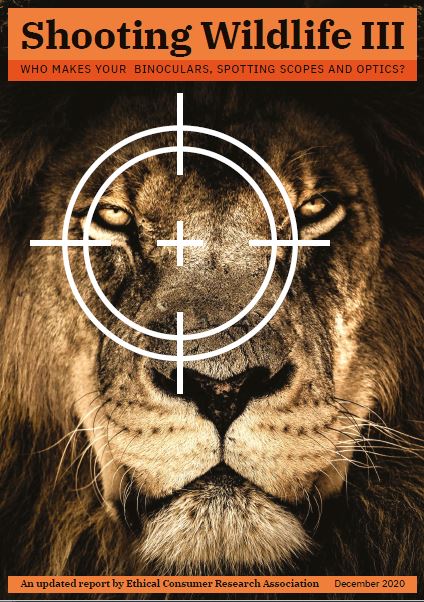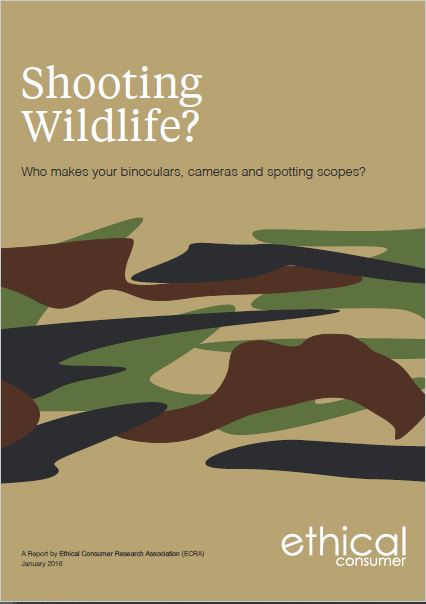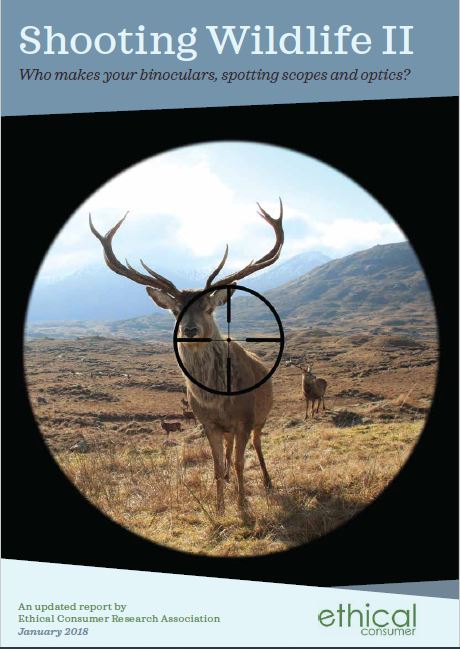In January 2016, Ethical Consumer Research Association published Shooting Wildlife? Who makes your binoculars, cameras and spotting scopes?. This report, and follow-up reviews published in 2018 and 2020, independently assessed the debates surrounding the ethics and impacts of sport hunting, including how 30 optics companies (29 in 2020) approached this sensitive subject.
Read the reports
Summaries
Below are summaries of the findings from the three reports. References, methodology and research are all included in full in the above PDFs.
Summary of findings (2020)
Hunting links
- 90% of companies have some connection to hunting compared to 83% in the 2018 report. 69% target specific forms of sport hunting: trophy, driven or ‘big-game’ hunts (compared to 66% in 2018). 48% have additional ties through pro-staff hunters, sponsorship of hunting organisations, TV shows or events, or through their own ‘academies’ for teaching skills for hunting. Nonetheless, the number of companies explicitly referencing ‘big-game’ or trophy hunting in their product marketing text have fallen by 2% (from 40% to 38%) since the last report.
- Kenko Tokina, which was recommended as one of the few companies without links to hunting in 2018, was found to also own the Sightron brand, which sold riflescopes and marketed its optic products to hunters. Optical Hardware, which owns the Visionary brand that was also recommended for not having links to hunting in 2018, mentioned hunting in its technical guide, which was now on the frontpage of its website. Its owner was also found to have an outlet website that marketed a pair of binoculars for hunting. Two more companies were found to have sponsorship links with professional hunters.
- Two companies (Carson and Fujifilm) had removed their riflescopes from their website, and Nikon announced it was ending its production of riflescopes. Although encouraging, riflescopes for all three companies were still for sale at the time of writing. Olympus said it was withdrawing from the optics business altogether in 2021.
It is clear that companies are feeling the pressure of increased public scrutiny since the publication of the last Shooting Wildlife? report. 75% of companies that still have strong links to hunting, have removed some photos, website sections or text references to hunting from their marketing work. However for most, these changes seemed to be mostly a change in marketing strategy and not a genuine move towards ‘wildlife friendly’ optics. None of them had stopped marketing to hunters completely.
Military links
69% of companies were found to supply optics or other imaging equipment to the military directly and/or market their optic products for military or tactical use.
Links were also found with the gun rights movement in the US. 28% of companies were found to have industry links with the National Rifle Association, while 10% were deeply embedded in the world of “hunting, shooting, public lands, the second amendment and good food”. One company was also found to use imagery related to militia and white supremacy in its marketing.
Environment
Companies’ approaches to managing their own environmental and climate impacts often fell short of those required to meet the science-based targets agreed in Paris in 2015. 83% of companies were considered to have poor environmental and carbon management and reporting, either because they had no sustainability reporting at all (52%) or because they reported in very general terms, without publishing environmental reduction targets and concrete plans to lower greenhouse gas emissions (31%).
Of the five companies with reasonable environment reporting, four were considered to have good carbon management and reporting and reasonable environmental reporting. They had climate change mitigation strategies that were in line with international agreements such as the Paris Agreement. All four were Japanese electronics companies, and so it’s likely that they did well because of Japan’s mandatory greenhouse gas accounting and reporting system, and its support for developing science-based decarbonisation targets.
Summary of findings (2018)
(a) Companies with strong links to hunting (66%)
25 (83%) of the 30 companies covered in this report had some connection to hunting.
Of the 30 companies, 20 (66%) were considered to have strong links to hunting – selling riflescopes and/or marketing products for sports hunting. 62% sold numerous sport hunting accessories, such as riflescopes, range finders, or night vision equipment. 50% marketed products specifically for trophy, ‘big-game’ and/or driven hunts in their promotional text, and were therefore considered to market to sports hunters. 45% had further links to hunting, through pro-staff, ownership by hunters, or the sponsorship of events. Two of these, Leupold & Stevens, and Zeiss, had their own ‘training academies’, where individuals could pay for courses on the use of optics in hunting.
Seven companies – Beretta, Eschenbach, Leupold & Stevens, Meopta, Vista, Vortex, and Zeiss explicitly referred to trophy shooting on their websites, although many more used images of traditional trophy animals.
By glamourising trophy hunting through imagery and language, optics companies promote a form of selective sport hunting that has been linked to changes in animal demographics, population health and animal migration.
(b) Companies that do not market to hunters (17%)
Interesting developments have occurred in this category since the last ‘Shooting Wildlife?’ report, with five companies (17%) (as opposed to four in 2016) not having any connection to hunting: Canon, Kenko Tokina, Olympus, Opticron and Visionary. Three of these did not have any connection to hunting at the time of the last report. However, Opticron had previously marketed a couple of products to hunters.
In December 2017, the company confirmed that it had deleted all mention of hunting “partly as a result of the ongoing work we are doing with conservation organisations”, and partly due to feedback “after the publication of the first version of the report that customers had chosen Opticron products because the brand is not supportive of trophy and other sport hunting.”
As Visionary only once mentioned hunting, in a technical guide that could be downloaded from its website, and did not do so in order to market products to hunters, it was also considered to fall within this category.
Fujifilm has begun to sell riflescopes and markets binoculars to hunters on its US website. It therefore is considered to have developed stronger links to hunting since the previous report.
(c) Companies with weak connections to sport hunting (17%)
Five companies (17%) had very weak links to hunting, perhaps mentioning in catalogues that a product could also be used by hunters but without having a dedicated ‘hunting’ section on their website. Four of the brands in this group are the same as those in the last report: Celestron, Pentax, Kowa and Viking. Barr & Stroud also now has very weak links to hunting. Barr & Stroud’s UK distributor, Optical Vision Limited, was no longer found to have links to other companies promoting sports hunting, as it did in 2015.
Viking Optical Limited (the sole supplier of optics to the RSPB) still had no direct links to hunting with its own-branded products, however, on its online optical centre, it sold branded optics, such as Zeiss, which were marketed to the hunting industry.
Companies with no, or very weak, connections with sport hunting (34% of the total) have perhaps the most to gain, and the least to lose, by considering whether to orientate themselves more firmly towards the market for wildlife enthusiasts.
Summary of findings (2016)
(a) Companies committed to sport hunting
25 (83%) of the companies covered in this report had some involvement in selling sport hunting accessories or marketing products at hunters. Of these 25 companies, 17 (57%) sold numerous sport hunting accessories, and marketed products directly at hunters. The remaining eight companies had weaker links with sport hunting, with one or two products being promoted for use when hunting, bird watching or playing golf. Not only were products promoted for use when hunting, but the promotional language used by 47% of companies referenced ‘big-game’ or trophy hunting.
(b) Companies without sport hunting connections
Only four companies (13%), Canon Inc., Fujifilm Holdings Corporation, the Olympus Corporation and Kenko Tokina Co., did not appear to sell hunting accessories and did not market products at hunters. Interestingly, these four companies are Japanese owned.
(c) Companies with weak connections to sport hunting
Six companies (20%) had very weak links to sport hunting, perhaps mentioning in catalogues that a product could also be used by hunters but without having a dedicated ‘hunting’ section on their website. The main brands in this group are: Celestron, Opticron, Pentax, Visionary, Kowa and Viking.
Companies with no, or very weak, connections with sport hunting (33% of the total) have perhaps the most to gain, and the least to lose, by considering whether to orientate themselves more firmly towards the market for wildlife enthusiasts.


